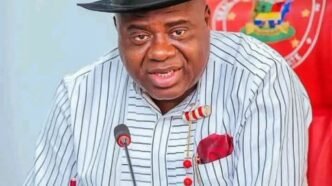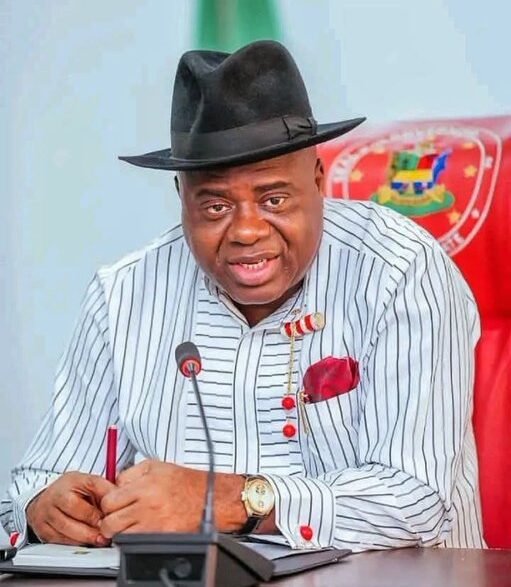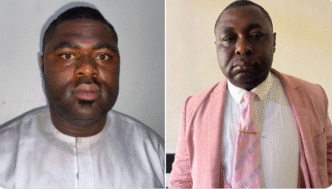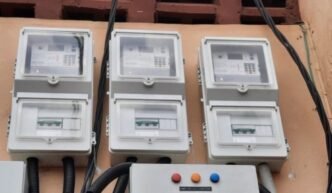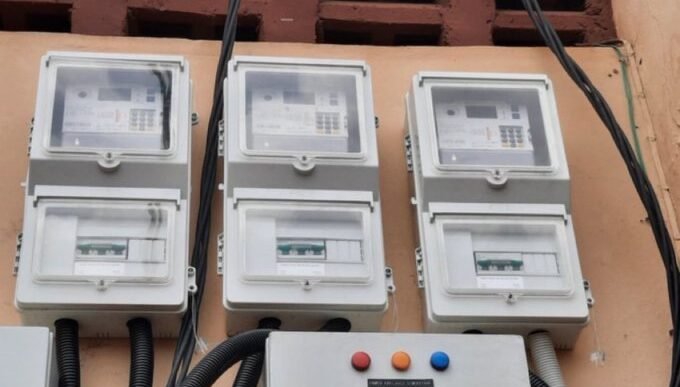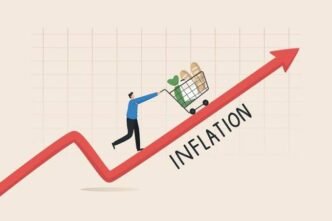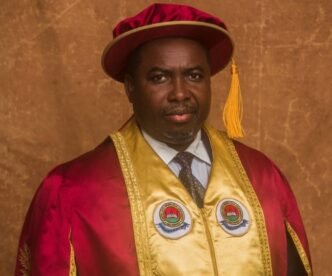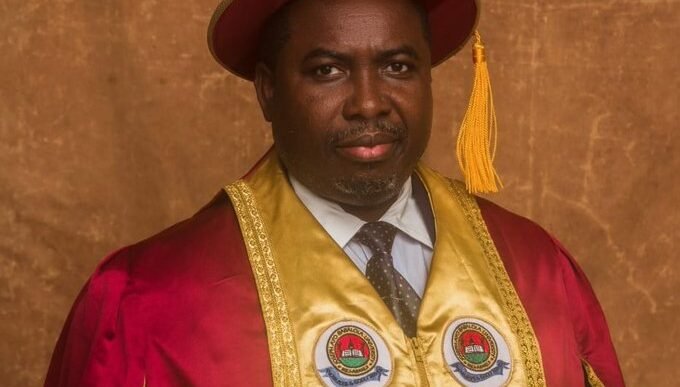Yenagoa, Nigeria — October 15, 2025 — In a dramatic turn of events that has sent shockwaves across Nigeria’s political landscape, Governor Douye Diri of Bayelsa State has officially resigned from the People’s Democratic Party (PDP). The resignation was confirmed on Wednesday, alongside that of 23 members of the Bayelsa State House of Assembly, signaling one of the most significant political shake-ups in the South-South region in recent years.
The governor’s decision to leave the PDP was confirmed by his Chief Press Secretary, Daniel Alabrah, who said that while Diri has indeed resigned, he has not yet declared allegiance to any other political party.
Official Confirmation
According to Alabrah, the governor’s resignation was formally communicated through a letter addressed to the leadership of the PDP both at the state and national levels. Reports indicate that Diri made the announcement during an executive council meeting at the Government House in Yenagoa, where he informed top government officials and party stakeholders of his decision to quit the PDP.
The governor reportedly cited “deep-seated internal divisions” and “irreconcilable differences” within the state chapter of the PDP as some of the major reasons behind his decision. Although he has not announced a new political platform, multiple sources within the Bayelsa political circle suggest that discussions are ongoing with leaders of the All Progressives Congress (APC).
Lawmakers Follow Suit
Governor Diri’s resignation triggered an immediate political domino effect as 23 out of the 24 members of the Bayelsa State House of Assembly also tendered their resignations from the PDP. Among those who resigned were the Speaker of the House, Abraham Ingobere, and other key members of the Assembly leadership.
According to reports from the Assembly complex, the lawmakers held a brief closed-door session before announcing their collective decision to exit the party. Their letters of resignation were subsequently transmitted to the PDP state secretariat and the Clerk of the Assembly.
While there have been conflicting reports about the exact number of lawmakers who resigned—some sources claiming 19 and others confirming 23—the consensus remains that a large majority of the Assembly members have left the PDP alongside the governor.
Why Diri Left the PDP
Governor Douye Diri’s resignation did not come entirely as a surprise to political observers. For months, there had been speculations about growing discontent between the governor’s camp and the PDP national leadership over control of party structures and the management of internal affairs in Bayelsa State.
Political insiders revealed that the final straw came after a series of attempts to reconcile differences between Diri and certain influential party figures failed. Tensions reportedly escalated after a group within the PDP loyal to a former South-South governor began lobbying for the dissolution of the existing state executive committee, a move strongly opposed by Diri’s loyalists.
In April 2025, the Bayelsa PDP publicly rejected claims that its leadership had been dissolved by a zonal committee. That internal friction, sources say, deepened mistrust between Diri and the party’s national secretariat.
Observers also point out that the governor had recently held several strategic meetings with political stakeholders, including local government chairmen, traditional rulers, and members of his cabinet. Those meetings were reportedly aimed at securing their backing for his next political move.
Defection Wave in the South-South
The Bayelsa mass resignation adds to a wave of defections that has recently swept across the southern region of Nigeria. Just a day before Diri’s announcement, Governor Peter Mbah of Enugu State had also resigned from the PDP and was reportedly finalizing plans to join the APC.
Political analysts believe that the timing of these moves is no coincidence, suggesting that the APC is actively consolidating its influence in states previously considered PDP strongholds. The developments come less than two years before the 2027 general elections, positioning the APC as the dominant force ahead of the next electoral cycle.
Diri’s exit marks the latest in a series of political realignments across the South-South, a region traditionally regarded as a PDP fortress. His departure is therefore expected to weaken the PDP’s hold on Bayelsa and could potentially shift the balance of political power in the Niger Delta.
Legal and Political Implications
The mass resignations raise important legal and constitutional questions. According to Section 109(1)(g) of the Nigerian Constitution, a lawmaker automatically loses their seat if they defect from the political party under which they were elected, except if their party is deemed to be in crisis. Whether the PDP in Bayelsa qualifies as being in crisis will likely be a key issue in the days ahead.
Party insiders say the PDP may head to court to challenge the lawmakers’ defections and seek judicial clarification on whether their seats should be declared vacant. However, given that the defectors are backed by the governor and control a majority in the state legislature, enforcing such a ruling may prove difficult in practice.
PDP’s Reaction
The national leadership of the PDP is yet to issue a formal statement on the resignations. However, sources within the party describe the development as a “severe setback” and “a wake-up call” for the opposition. Some PDP governors, including those from the South-West and North-Central regions, have reportedly begun holding emergency consultations to prevent further defections.
Party loyalists in Bayelsa have expressed disappointment at the governor’s decision, accusing him of abandoning the platform that brought him to power. Others, however, argue that Diri’s resignation was the inevitable result of long-standing internal wrangling and poor conflict management at the national level.
APC’s Silent Watch
Although Governor Diri has not formally joined the APC, sources close to the ruling party say talks have been ongoing between Diri’s aides and top APC officials. The governor’s decision to delay his formal defection is believed to be strategic, allowing time for consultations and negotiations regarding the terms of his entry.
For the APC, Diri’s potential defection would be a major political prize. Bayelsa is the home state of former President Goodluck Jonathan and one of the few oil-rich states still under PDP control. Bringing Diri into the APC fold would not only enhance the party’s image in the South-South but also strengthen its influence ahead of the 2027 polls.
Implications for Bayelsa’s Political Future
With the governor and a large majority of the state assembly now out of the PDP, the political dynamics in Bayelsa are set to change dramatically. The PDP could soon find itself without meaningful representation in the state government, while any new party Diri joins would immediately assume political dominance.
Analysts warn that this shift could have far-reaching effects on policy direction, budgetary priorities, and development programs in the state. It may also alter federal-state relations, particularly if Diri aligns with the ruling APC at the national level.
What Next for Governor Diri?
Governor Douye Diri, often described as calm and pragmatic, has built a reputation for being one of the more moderate figures within the PDP. His defection could reposition him as a central player in national politics, especially if he successfully negotiates entry into the ruling party on favorable terms.
There is also speculation that Diri’s move could be part of a broader strategy aimed at building a coalition for the 2027 elections, possibly aligning himself with politicians from other regions who have recently broken away from the PDP.
Conclusion
Governor Douye Diri’s resignation from the People’s Democratic Party, along with 23 members of the Bayelsa State House of Assembly, marks a turning point in Nigeria’s political history. The mass exit not only reshapes Bayelsa’s political landscape but also signals deeper troubles within the PDP as it struggles to retain its traditional base in the South-South.
While Diri has not officially declared for another party, all indications suggest that his political journey is far from over. As Bayelsa and Nigeria watch closely, one thing remains certain — the ripple effects of this defection will be felt well beyond the creeks of the Niger Delta and could redefine political alignments ahead of the next general elections.

